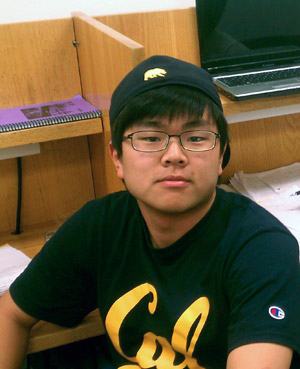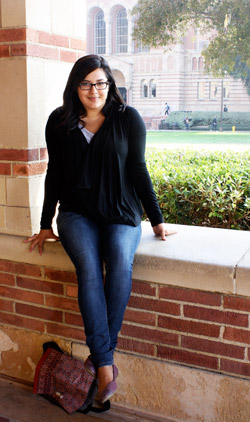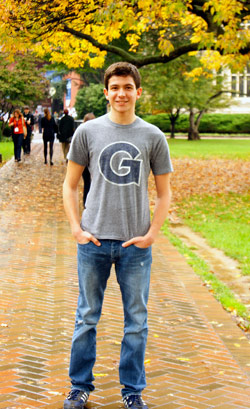College essays that worked
By Ben Bang
 According to Google Maps, for the past two years, I have been living exactly 5,987 miles away from my family. My family came to America in 2007 from the Republic of Korea when my dad was selected as a visiting professor at Cal State Fullerton for a year. After his time was done, my parents and older sister returned to Korea. But I chose to stay behind because I found the United States’ education system more attractive than Korea’s due to its greater focus on individualism and freedom. My parents understood my perspective and so my mom set me up with a homestay. Because I have no relatives in the U.S., I was in a whole new environment with no one to rely on but myself.
According to Google Maps, for the past two years, I have been living exactly 5,987 miles away from my family. My family came to America in 2007 from the Republic of Korea when my dad was selected as a visiting professor at Cal State Fullerton for a year. After his time was done, my parents and older sister returned to Korea. But I chose to stay behind because I found the United States’ education system more attractive than Korea’s due to its greater focus on individualism and freedom. My parents understood my perspective and so my mom set me up with a homestay. Because I have no relatives in the U.S., I was in a whole new environment with no one to rely on but myself.
Separation meant freedom at first. My guardians rarely took the initiative to bother me about my grades. My mom’s authority over me was inversely related to the physical distance between us. Everything I did was completely up to me. I was thrilled to have total independence. I could binge on video games for days and days without anyone nagging me.
But soon, my autonomy turned out to be a curse rather than a blessing. Feelings of loneliness, the burden of responsibility, and lack of guidance quickly overshadowed the joy of freedom. First of all, I was painfully alone. In a new neighborhood and a new country, fitting into a group of students who speak a totally different language was intimidatingly hard. People were nice to me, but I was never able to feel as natural as when I was in Korea with my family. Slowly, however, I found my niche at school and church.
Along with the social hurdle was a higher hurdle of responsibility. School forms, cell phone bills, daily chores quickly took over the time I spent for my own entertainment. At some point, I was angry at the ironic fact that I had to take care of someone—myself. Then it struck me that this was what my parents had felt when they were cleaning my mess all the time. I didn’t complain about my work after that. It became second nature to fill out my address, insurance subscriber number, last tetanus shot date, and my checking account number. I had to attend both the parent and student meetings for school, sports and extracurricular activities. With no one nagging me, I had to pinch myself to work whenever I felt like procrastinating. In addition, because I didn’t have my parents with me, I sought out my own network of friends and counselors whom I could ask for any kind of advice.
My pastor once said to take struggles as blessings, as they provide chances to grow in character. He was right. These past two years of struggles and separation from my family helped me develop my character and achieve my goal of becoming a well-educated, independent person. Also, even with this great chasm between us, my family has greatly influenced me. I dream of becoming a great businessman following the footsteps of my business professor dad and possessing my mom’s outgoing and brave personality. I gradually figured out that my world is a value that is neither fixed nor stationary. It is a continuous accumulation of my family’s influence and my own experiences. It does not matter where I go or who I am with because my world always resides in me. My first adventure turned out to be a success, and I am very excited to embark on a bigger one in college.
Ben Bang is a Palos Verdes Peninsula High School graduate who now attends UC Berkeley.
l
By Audrey Salas
 I do not watch TV. It is not that I hate it. It is just that it has rarely conjured up enough interest for me to make it a priority in my life. Books, school, friends, and family were much more interesting than the junk on TV. As a result, I considered myself above the schmucks who wasted hours of their lives in front of the tube. Unfortunately, as fate would have it, I was blackmailed by my boyfriend into watching the 2005 series of Doctor Who. It is a show about time travel that first aired in 1963 and taped its last episode in 1989. It disappeared for 16 years and for good reason: the computer animation was horrible, the plot lines outrageous, and the soundtrack beyond cheesy. Despite all of that, the ninth Doctor (played by Christopher Eccleston), and his beautiful companion in time travel, Rose (played by Billie Piper), changed the way I viewed the world―and the “schmucks” in it.
I do not watch TV. It is not that I hate it. It is just that it has rarely conjured up enough interest for me to make it a priority in my life. Books, school, friends, and family were much more interesting than the junk on TV. As a result, I considered myself above the schmucks who wasted hours of their lives in front of the tube. Unfortunately, as fate would have it, I was blackmailed by my boyfriend into watching the 2005 series of Doctor Who. It is a show about time travel that first aired in 1963 and taped its last episode in 1989. It disappeared for 16 years and for good reason: the computer animation was horrible, the plot lines outrageous, and the soundtrack beyond cheesy. Despite all of that, the ninth Doctor (played by Christopher Eccleston), and his beautiful companion in time travel, Rose (played by Billie Piper), changed the way I viewed the world―and the “schmucks” in it.
Doctor Who is one of those shows most people would not openly admit to liking; its mystery and comedy are best reserved for hardcore nerds who do not have a reputation to harm in the first place. That was me, so I figured watching it could not damage anything but my own self-respect. Despite the fact that I knew I was a nerd, I still thought that I was better than people like my boyfriend who spent their time watching that kind of stuff. I thought that being book smart and occasionally witty would be enough to advance my social status in the world. I was being a pretentious twit.
I would not admit it to myself, but I was getting much too attached to the storyline. Each episode seemed to desensitize me to its corniness. With every battle the Doctor and Rose won against intergalactic fiends, my face got closer and closer to my glowing computer screen. With every intimate, verging-on-point-of-love scene the Doctor and Rose shared, my heart thudded louder than the lame sci-fi music coming from my red Lego speakers. When it came time to watch the Doctor’s final episode, I could not help the sinking sensation in my stomach. It was coming. Christopher Eccleston, an actor and personality whom I had come to love, was not going to be a part of the Doctor Who universe anymore. Worse still was the fact that the romance he built with Rose could be destroyed by his change in personality. When it finally did happen and the season ended, I bawled for a good ten minutes.
A few tissues and a hot, steamy shower later, I realized that I had become what I had previously considered to be a loser: a TV show-watching schmuck. I allowed a mere TV show to humble me into embittered tears and an embarrassingly unrelenting emotional attachment. The funny thing was that I was better for it. I lost the stupid idea that I was better than anyone just because they were doing something they enjoyed. I was being the real loser, but thanks to the Doctor, I am not like that anymore. I learned to embrace people’s interests and accept that even something as cheesy and lame as Doctor Who could make a positive difference in someone’s view of the world. Thanks, Doctor.
Audrey Salas is a Bravo Medical Magnet High School graduate who now attends UCLA.
l
By Esteban Garcia
 I could feel my stomach turn as the girl next to me ended her response. I cleared my throat and addressed the members of the press assembled for the Teen Roundtable on Community Violence in the offices of L.A. Youth, a newspaper by and for teenagers. I spoke about the occasional outbreaks of violence at my school and in my community but also of the general sense of security I feel. I was pleased, confident in my response. But the next girl made what I had said seem like an illusion. My own words of security were destroyed by her story of death threats and sleeping with fear.
I could feel my stomach turn as the girl next to me ended her response. I cleared my throat and addressed the members of the press assembled for the Teen Roundtable on Community Violence in the offices of L.A. Youth, a newspaper by and for teenagers. I spoke about the occasional outbreaks of violence at my school and in my community but also of the general sense of security I feel. I was pleased, confident in my response. But the next girl made what I had said seem like an illusion. My own words of security were destroyed by her story of death threats and sleeping with fear.
Of the five different teens assembled there from across the city, I knew only her. Despite living in the same general area, her experience with violence shocked me. Thus far, I had lived a life in which violence was a series of images of gangsters and thugs, people who looked nothing like me. It happened to other people in other places, and I had never been touched by it. But words of fear from someone I went to school with shocked me. After the initial shock, however, came a period of reckoning. I opened my eyes to the realities of living in an area of great diversity. Diversity itself changed for me. I no longer saw cartoon images of children of different colors, but I instead recounted that story of the struggles of my schoolmate. I slowly came to recognize that diversity lies not in coming from different countries and eating different foods. It comes from living entirely different realities.
Following the conference, I made an effort to continue my exposure. I spoke to the friends I already had and made new ones in an effort to really absorb the opportunity I had in living in such a diverse area as Southern California. I again listened intently as another friend spoke of her struggles as a smart, strong female in a home in which traditional Arab Orthodoxy was in full force. While I could not feel what she was feeling, I did come to appreciate her strength and the wealth that her experiences and those of others I spoke to brought to my environment.
The future life I would like to live is one in which diversity is not a cartoon image but a working reality. My efforts now to understand how others live have not only armed me with an appreciation for diversity but with an important skill: the ability to make connections. In exposing myself to others, I have learned how to draw links between my own life, what I already know, and what new information is provided me. It is this skill that will serve me well on my path of higher education and beyond.
Esteban Garcia is a Warren High School graduate who now attends Georgetown.
l
By Elliot Kwon
I remember the first time I crossed over it, its green, algae-filled water raging through the wide concrete ravine, rusted railways running along its sides, neon graffiti adorning both shores for miles on end. For many years I ignored this manmade ditch. To me, it was the shameful side of Los Angeles—something to hide or get rid of.
I am, of course, talking about the Los Angeles River.
It wasn’t until four years later in 2006, the year when the elders of my church decided to join in on the annual LA River Clean Up sponsored by the nonprofit organization Friends of the LA River (FoLAR), that I really began to take interest in it. Initially, I did not want to participate at all. My mind flashed back to the first impressions of this “river” and clearly, wading in industrial runoff smelling of chemicals and sewage was definitely not my idea of a good time. However, thanks to my mom’s persistent nagging – she emphasized that we needed to respect all of God’s creations – I grudgingly gave in.
When I got there, though, I found myself in the midst of lush green trees and plants. I wasn’t aware that we were cleaning up the upper section instead of the familiar downtown segment, the concrete section. It was strange to see how it seemed so “normal,” beautiful even, with birds circling overhead enjoying the crisp morning air, frogs singing their usual tune, and trees flourishing over the clear waters that snaked along the sandbanks. Was this truly the same river I saw downstream the other day?
It struck me how much potential the river actually has, certainly enough to improve the quality of life for the thousands of residents living beside it if it were renovated. I got curious, inspired even, to learn more about its history, wondering if it could become something more than it is now.
After a brief searching session, a profound discovery: the river wasn’t manmade. What I had initially considered to be a massive sewer turned out to be the reason why Los Angeles was established here in the first place back in 1781. From the western end of San Fernando Valley to its terminus in Long Beach, it flows straight through the heart of LA, passing communities such as Glendale, Downtown LA, and Compton that once depended on it for water until the Los Angeles Aqueduct was built in 1913.
Because of its random floods and the constant changes in its course, the Army Corps of Engineers finally took action in 1938 by digging a deeper riverbed to contain the rising levels of water. Eventually it was encased with concrete to curb erosion and to prevent further changes in its course. It’s a shame that people back then didn’t bother to think about the ultimate consequences that we live with now.
But it doesn’t have to be this way forever. In South Korea, the government of Seoul had once covered up its own river, Cheonggyecheon, by putting roads and buildings over it in 1958 because it couldn’t afford to clean up the polluted water. It was left that way until 2003, when the mayor finally decided to restore it. The memories of dirty, unregulated flea markets and the crime-infested streets that once ran over it still remain vivid in my head; so seeing this dramatic transformation and its positive effects on the inhabitants’ quality of life let me realize just how much influence an architect could have on people’s lives directly. Drawing a parallel between what happened in Seoul and what could happen in LA, I became excited about the possibilities the field of architecture and urban planning offered me. Why couldn’t we do the same thing here in LA?
Throughout the years, I’ve traveled along its entire course, hoping to see more of its potential and to find inspiration for my artwork and architectural models, some of which I have submitted in my supplementary portfolio where applicable. However, having found out that the more pressing matter was to let the people know that we even have a river in LA, I’ve done some things to raise awareness, such as writing an article about it in the teen newspaper LA Youth, to get people excited as much as I am about the river.
But I don’t want to stop there: really, my final ambition is to lead the restoration projects someday as an architect. The LA River has gifted me with a sense of purpose, a reason to pursue architecture. In return, I hope to take part in realizing its true potential to become the green backbone of our city, maybe even to become the new image of Los Angeles one day.
Elliot Kwon is a Palos Verdes Peninsula High School graduate who now attends Columbia.




